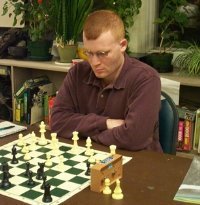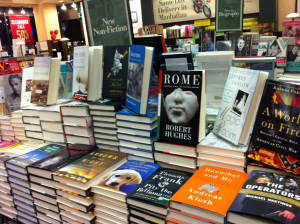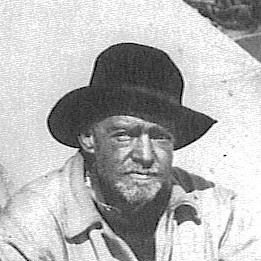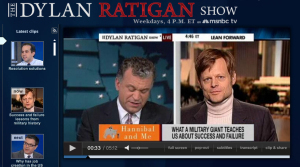Andreas Kluth's Blog, page 6
January 10, 2012
Talking with Fiammetta about Hannibal & Me

Fiammetta Rocco
Here is an 8-minute podcast of a chat between Fiammetta Rocco, our Books & Arts editor at The Economist, and me, about Hannibal and Me.
We were all over the place in our actual conversation, but our colleague Lucy Rohr did a Herculean job of editing it down to 8 minutes.
Topics covered: Tiger Woods and Eleanor Roosevelt, in particular, plus some Meriwether Lewis and the rest of the gang. 
(And if you want an amusing visual of how I tape these interviews with London, go back to this old post.)
Filed under: Books, failure, Hannibal, Hannibal and Me, success, The Economist Tagged: Eleanor Roosevelt, Meriwether Lewis, Tiger Woods








Strategy & Taoism: the chess master's view

Howard Goldowsky
Some of the first reactions to my book are now streaming in, which is enormously suspenseful for me. You are each projecting yourself into the stories in my book, each finding completely new ways of looking at them and, yes, your own lessons to take away from them. This is just as I intended, so I'm feeling good.
Here, for instance, is an email I just got from one Howard Goldowsky, who happens to be a chess wizard, and thus a strategy connoisseur, as well as a chess writer. Check out his Amazon page.
(By the way, I will never post or publish your emails or other reactions without explicitly asking for permission. So never worry if you want to critique the book to me discreetly.)
Here is Howard:
I think that the last few paragraphs about equanimity sum up your entire book. In a way, what you present in "Hannibal and Me" is almost a Western interpretation of Taoist and some Buddhist philosophy. In my mind, it's no accident that the book's finale included a passage from the East. Is not the essence of self-actualization the monk's daily routine of meditation, 'chop wood and carry water?'
Chess expertise parallels life more ways than imagined. In chess there is a very distinct line between strategy and tactics. In chess, good players are always trying to level their emotions to equanimity. In chess, we often use our opponents' aggressiveness against them. In chess, there is a constant balancing act between general principles and specific situations. Too many parallels to mention here….but these are universal truths we're talking about, so it's not such a wonder that these parallels exist.
Filed under: Books, Hannibal and Me Tagged: chess, Howard Goldowsky, strategy








January 6, 2012
The 10-minute chat

One of you (Thank You!) texted in the picture above, taken in a Manhattan Barnes & Noble outlet. There it is, that bright orange jacket, hard to miss.
Unfortunately, I did not, yesterday, find any copies in my local Barnes & Noble outlet here in LA. The guy looked into his computer and said they were "on the way, could be tomorrow, could be in a week." There's modern logistics for you.
In any case, Bill Frank ("Billy the Brain") of KKZZ radio has now posted our chat yesterday. It's about ten minutes long.
I'm on my landline, and sounding somewhat distant, but it's a good conversation. Thank you, Bill!
Filed under: Books, Hannibal and Me Tagged: Bill Frank, Billy the Brain








January 5, 2012
The 4th review: New York Journal of Books
Wow. Just wow. What can I possibly say?
The New York Journal of Books has now reviewed Hannibal and Me.
(Remember, the previous reviews were by Publishers Weekly, Kirkus Reviews and Booklist)
I will quote some bits and then shut up.
Fight any urge to dismiss Hannibal and Me as boys-only self help. True, the book comes complete with warriors, military strategies, elephants, golf, and a seductress, but this book is a serious and fascinating exploration of issues many of us grapple with on a daily basis. Highly recommended.
When was the last time reading a book left you with a burning desire to read more books? Hannibal and Me: What History's Greatest Military Strategist Can Teach Us About Success and Failure affects the reader in just this way. Having hung on to Mr. Kluth's every word, this reviewer closed the book determined to read Jung again, revisit Maslow, and reacquaint herself with Eleanor Roosevelt….
And true to his word, he proceeds to beguile his readers with a series of charmingly rendered anecdotes, keeping us spellbound, and gently nudging us toward a deeper understanding of the triumphs and disasters of Hannibal (the Carthaginian general who crossed the Alps with his army in 218 BCE), Meriwether Lewis, Cleopatra, Tiger Woods, author Kluth's own uncle (a key figure in postwar Germany), and ourselves.
Mr. Kluth tackles taboos, boldly reintroducing ideas banished from Western intellectual discourse since the 1960s. He dares, for example, to raise notions like duty—not the tired old just-say-no-back-to-basics-family-values platitudes The Right warms over each election cycle. This is something deeper…
In some ways Hannibal and Me is a synthesis of many the intellectual and spiritual movements since the sixties. As such it risks veering into the banal, or skirting New Age nonsense, but whenever Mr. Kluth approaches this precipice, he retreats in time, turning back to the stories of real heroes. …
I was surprised by the last bit, which we might find time here on this blog at some point to discuss:
Despite applying his considerable insight, charm and intellect to so many weighty questions, Mr. Kluth deftly avoids deep analysis of why male crisis so often involves betraying wife and family. … Mr. Kluth seems to hand cheating husbands and deadbeat dads the perfect justification for their behavior. One can almost hear everyday cheating husbands quoting Hannibal and Me to justify their bad behavior.
Hmmm. Really?
That's for another time. For now: Jillian Abbott, Thank You!!
Filed under: Books, Hannibal and Me Tagged: Book reviews, New York Journal of Books, Reviews








Dylan Ratigan and I, the backstory
So here are my five minutes on MSNBC with Dylan Ratigan.
And here is the backstory:
I had made a beginner's mistake: Yesterday, I got a bit of redness above my right eye, eczema or something, as I occasionally do. Normally, I ignore it, but today I remembered some cream that my mom had once sent me for exactly this purpose. I fished it out of the closet and rubbed it on. And apparently, I got some in my eye.
Just as I was arriving at the studio, my right eye started gushing tears. Great.
This is what wives are for. So I texted mine, and she texted back, while I was still in the parking lot:
think about Hannibal and his one conjunctivitis eye.
So that's what I did. I was clutching a Kleenex during the clip, and kept wiping the tears away.
So, not that bad a performance, considering. 
Filed under: Books, Hannibal, Hannibal and Me, Life Tagged: Dylan Ratigan, MSNBC








January 4, 2012
Off I go on radio and telly…

Dylan Ratigan
So tomorrow (January 5th) is the launch date, which means that you Kindlers and Nookers will get your book, and you Hard-copiers will get the Amazon or B&N shipping confirmation. And, of course, there are always those … whatchammacallit … book stores to walk into.
For me, it means I'll be talking on radio and TV a bit. You can even call in to one show. See below.
1) Jiggy Jag
It actually started today, on a radio station called KJAG in Kansas, when I chatted with James Lowe, aka Jiggy Jaguar, formerly described as a "shock jock" (although I found him very meek). I was on Skype, so my voice quality is atrocious.

2) Billy the Brain
Gotta love these radio names. So tomorrow I'll first be on a California radio station called KKZZ AM 1400 – Positive Talk Radio with, which also streams on BrainstorminOnline.com, with yes, Billy the Brain.
That'll be at 1:40PM East Coast time, 10:40AM West Coast time. The Brain has asked me to tweet the call-in number, which is (805) 639-0008. Since I don't have a Twitter account, let's consider this hereby announced.

3) Dylan Ratigan, MSNBC
Then, at some point between 4PM and 5PM Eastern (1PM and 2PM Pacific), I'll be on national television with Dylan Ratigan of MSNBC (pictured at the very top).
The important question here is obviously: shirt with tie, shirt without tie, turtleneck, or décolleté? (If you have an opinion on that, do offer it before I get dressed tomorrow morning.)
More as I find out about it…
Filed under: Books, Hannibal and Me Tagged: Billy the Brain, Dylan Ratigan, Jiggy Jaguar, MSNBC, radio, TV








Thoughts (not mine) over coffee before 7AM
My wife and I just got a heart-warming email from an old friend (who shall remain anonymous), with just the sort of thoughtful, soulful reaction to my book that I was aiming for when writing it:
Wow. Just read the Salon bit. Had me crying and laughing. (I was reading it over morning coffee before 7 am, when I am prone to be emotional.)
I have to admit, for these several years, I never quite "got" what Andreas was on about with this whole Hannibal thing. And now, in those Salon paragraphs, it has all become so damn clear. Through Andreas telling that individual, personal narrative, seeing it reflected in my own life, and then seeing up, with ever greater reverberations, expanding out to the great truths of all lives.
Been thinking a lot about the narratives of my own life these days. A lover of nature. A scientist. Successful conservationist. [...] Failed Buddhist. Living in the heart of a loving community of friends, even if it is a geographically dispersed community of friends. Me not maintaining that community of friends as much as I used to, as much as I should. Me craving romance, yet terrified of sex, terrified of intimacy. Neurotic, bordering on psychotic.
What are my successes? What are my failures? Has one come at the cost of the other?
Chogyam Trungpa once said something about how our brilliance, in that Buddhist, primal human sense, is the direct result of our neuroses. It is not despite our neuroses that our most beautiful and generous properties come, but because of them. In Kipling's terms, "brilliance" and "neurosis" are two imposters, to be treated the same…
Filed under: Books, failure, Hannibal and Me, Life, success Tagged: Buddhism, friends








December 30, 2011
Dealing with disaster

Shackleton
Chapter 7 in Hannibal and Me is titled "Dealing with disaster". So, how does the Hannibalic story tell us to deal with it?
First, a reminder about the premise of my book: I use stories of real people to make universal points. Put differently, I use the people in the stories to personify lessons (but you, the reader, ultimately have to adapt the lessons to your own life.).
The first personification of responding to disaster in life is named Quintus Fabius Maximus. (From the picture above, you may have guessed that by the end of the chapter he will have a "twin" in Ernest Shackleton, as I explain below).
As I introduce Fabius on page 144 ff., he
came from one of the oldest and noblest families of Rome, the Fabii, who claimed they could trace their ancestry back to Hercules. But Hercules was not exactly the first image that came to mind when looking at Fabius himself. When he was a boy, one of his nicknames was Verrucosus — "Warty" — because he had a big wart on his lip. Another nickname in his youth was Ocivula, "Lamb," because he had an unusually mild temper for an aristocratic Roman boy. He did everything slowly. He spoke slowly, walked slowly, learned slowly. He was bad at sports in a society that was all about athletic, virile, and martial games. Young Fabius was in almost every way the exact opposite of young Hannibal. …
And yet the Romans gradually changed their minds about the warty, lamblike Fabius. As the boy grew into a man, that same slowness began to look like steadiness and prudence…
He was already in his forties when [the Romans] first elected him consul. As senator or elder statesman, five times as consul and twice as elected "dictator," Fabius remained one of the republic's leaders for the rest of his life.
By the time the young and dashing Hannibal crossed the Alps into Italy, Fabius was already in his sixties. … Fabius had never encountered such an enemy. What, Fabius reflected in his slow and methodical way, should he, and Rome, make of Hannibal?
And then, of course, the disasters began. Battle after battle in which Hannibal routed Roman armies that outnumbered him. Rout is the wrong word. Hannibal exterminated Roman armies, he depleted the Roman population of men, of senators, of sons, of fathers. From the Roman point of view, Hannibal represented the extinction of Rome.
How Hannibal did that — how he won those battles — I deal with in the preceding two chapters. But in Chapter 7, I'm looking at these events purely from Fabius's side, so that we can understand how to deal with disaster.
And Fabius offers us a psychologically layered answer. Page 146:
… The younger Roman leaders found this hard to admit, but Fabius simply accepted that Hannibal was superior on the battlefield. That premise led Fabius to a simple but shocking conclusion: if going to battle against Hannibal meant losing, it was clearly not a good policy to go to battle against him at all. …
In these extreme circumstances, Fabius decided, the strategic definition of success was no longer victory but stalemate. In his slow and methodical way, Fabius thus determined that Hannibal's stunning triumphs on the battlefield might yet lead to nothing. They might be impostors.
So what were the elements of his response, of "the Fabian response" in the language of my archetypes?
Page 153:
There are two aspects to a Fabian character that make it resilient and that you might remember if ever disaster should strike you. The first is the ability to accept reality for what it is. The second is the ability to stop resisting reality and instead to flow with it until circumstances begin to change.
1) Acceptance
From page 154:
Shock, denial, anger, bargaining, depression, and finally acceptance: these are the stages that make up the human "grief cycle" described by Elisabeth Kübler-Ross, a twentieth-century Swiss doctor who spent her time caring for dying people…
Losing your job, losing your house to foreclosure, being diagnosed with cancer, getting divorced — any bereavement, failure, or other disaster triggers the psychological responses of the grief cycle. But people move through the grief cycle in different ways. Some progress swiftly, others get stuck at one stage, and yet others cycle back and forth through them. …
Page 157:
Eventually, however, some grief-stricken individuals will arrive at a state of acceptance. As Kübler-Ross puts it, "Acceptance should not be mistaken for a happy stage. It is almost devoid of feelings." But it is the stage where the person is ready to move on…
I illustrate this wrenching process in this chapter by looking at Eleanor Roosevelt, who suffered through the grief-cycle after discovering the love letters between her husband and their secretary, Lucy Mercer. Roosevelt literally cried and raged it out, while sitting for hours and days and weeks in a park, gazing at the female face of a statue called … Grief.
2) Flowing (or "non-doing")
As Fabius himself said (to a consul who would soon be killed because his co-commander refused to heed this advice): "Can you then doubt that inactivity is the way to defeat an enemy?"
Page 158:
One translation of Minucius's [a Roman rival to Fabius] taunt about Fabius's do-nothing tactics into Chinese is wu wei, which means "nondoing" or "doing by not doing." Wu wei happens to be a central concept of "the way," the Tao, in Chinese philosophy. This Taoist notion of wu wei, nondoing, is often mistaken for passivity, which it is not. Instead, nondoing is really a very active way of letting inevitable things happen without wasting energy resisting them, instead bringing one's own position into harmony with this flow of nature. The principle of wu wei might say, for instance, that is is better to use a rushing stream to spin a wheel and transfer its energy than to block the stream and try to make it stop flowing. Or it might say that a skipper is better off tacking through the wind than trying to go against it, which would be futile. Indeed the best skippers often look, as Fabius did, as though they were "doing nothing"….
I then illustrate this point by looking at Ernest Shackleton, who (page 161),
decided to cross the entire Antarctic continent on foot. It was as daring in 1914 as it had been in 218 BCE for Hannibal to Cross the Alps…
But, as you all know, Shackleton failed at his quest, when his ship, the Endurance, got stuck in the ice.
Page 162:
Shackleton's first reaction was to order his crew to do what heroes normally do: fight. The men climbed onto the ice and hacked away at it with picks, trying to open a sea-lane. But it was useless…
They now spent the Antarctic winter on their ship, which was frozen into its ice pack. No light, eternal darkness. All the stages of Kübler-Ross's Grief Cycle.
Then the ice crushed the Endurance, and the men watched as their ship sank. Page 164:
Suddenly, the men were all alone, floating on ice somewhere near the South Pole.
Shackleton announced new plans of daring and heroic resistance: they would march, while dragging their own life boats, across the ice toward an islet, covering roughly the distance from San Francisco to Loas Angeles. Page 164-165:
After three hours of hard toil, they had moved one mile. It began to snow. The next day they tried again, but the snow was like glue. … The next morning they tried again. Shackleton went ahead and scanned the ice. He saw pressure ridges where colliding ice floes had formed mountains that looked as forbidding as the Alps.
Shackleton turned around and walked back to the group. He took deep breaths of the icy air and prepared to announce his decision, which he knew was probably the weightiest of his entire life. At first, he had thought that attacking the enemy was the best thing to do, both for morale and for their chances of survival. But he now thought that he might have been in denial. During the night, he had accepted reality, and seeing the endless ice mountains around them had confirmed it. Instead of attacking and wasting caloric energy to make at most a mile a day toward who knew where, they would instead … do nothing.
And to understand why this saved him, why this turned his disaster into one of the greatest triumphs in human history, you have to know something about the ice. For that, you'll have to read the book.
The ice … the Tao.
Fabius, Roosevelt, Shackleton … you.
To be continued.
Filed under: Biography, Books, disaster, failure, Hannibal and Me, Life Tagged: Chapters, Eleanor Roosevelt, Ernest Shackleton, Fabius, grief cycle, Kubler-Ross








December 28, 2011
A sort-of memoir
Los Angeles Magazine, a sophisticated West-Coast glossy, has just put Hannibal and Me on its "reading list" for January.
I'm in the non-fiction category, obviously. More interesting is perhaps the one-line description they've given me. I still struggle to say in one breath what my book is; so I'm endlessly curious how other people do it in one breath.
The editors at LA Mag went with:
Hannibal—remember the guy who invaded Rome on elephants two thousand-plus years ago?—is the starting point for this sort-of memoir from the West Coast correspondent of The Economist.
A sort-of-memoir. Hmmm. Why not?
Let's see what the next one kicks up. 
Filed under: Books, Hannibal and Me Tagged: Los Angeles Magazine













